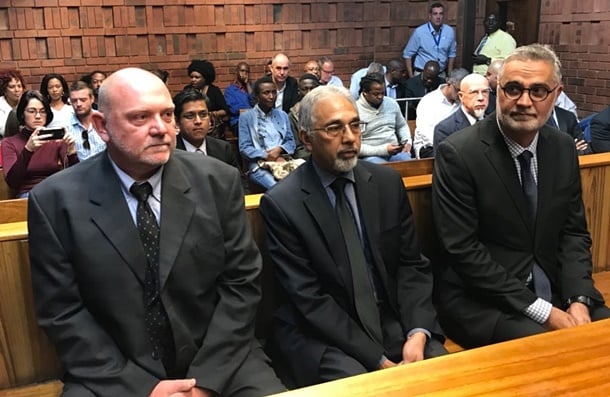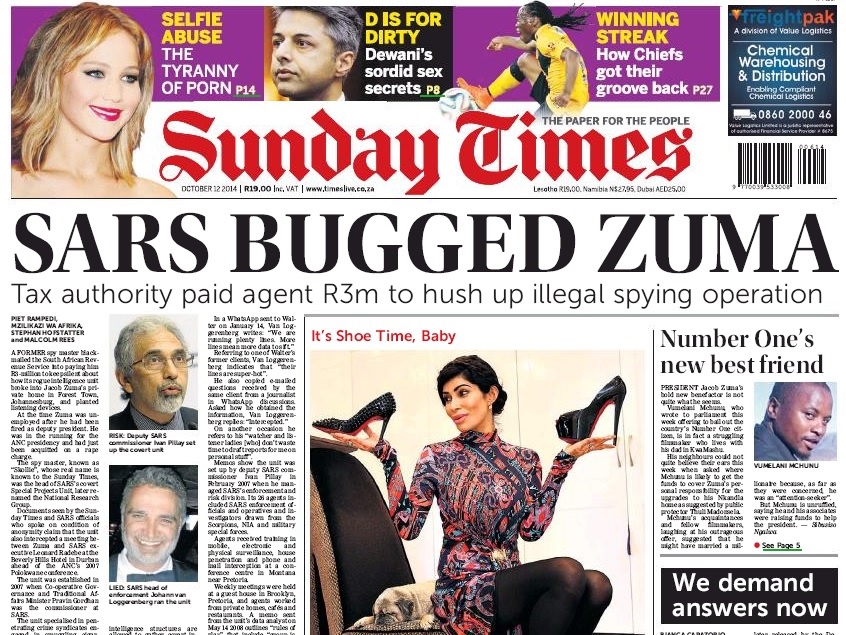On October 12, 2014, the Sunday Times stated in bold black letters on its front page: "SARS bugged Zuma".
The reader was taken into a dark, murky world of spooks, lies and multi-million rand bribes surrounding the alleged bugging of former president Jacob Zuma's home in Forest Town.
This was the first major salvo in what would in the next five years become a point of intense debate across the country over whether SARS had an intelligence unit, whether it had gone rogue, and whether it was all legal or not.
The article, stating as fact that a rogue unit existed at SARS, claims tax officials planted bugs "sometime" shortly after Zuma was acquitted of rape. This acquittal occurred in May 2006.
The unit in question however, was only born the following year, in 2007.
But 10 investigations since 2009, including by the Hawks and the National Prosecuting Authority (NPA), the State Security Agency (SSA) and the Inspector General of Intelligence have not led to any charges or arrests relating to the establishment of the unit.
Instead, despite the heaps of allegations against the unit and SARS, only three men (former deputy commissioner Ivan Pillay and former enforcement executives Johann van Loggerenberg and Andries "Skollie" Janse van Rensburg) were charged with offences relating to the bugging of the offices of the erstwhile Scorpions and the NPA, also in 2007, known as the Project Sunday Evenings case.
Investigation number 11 was conducted by the Public Protector, Advocate Busisiwe Mkhwebane who released her report on Friday.
She was reacting to an anonymous complaint and an additional complaint by the EFF's Floyd Shivambu, who have openly declared they want Gordhan out of office.
Mkhwebane found:
- The unit was unlawfully established in 2007.
- It conducted illegal covert intelligence gathering as part of its investigations.
- Procured spying equipment; and
- recruited officials for the unit – officially known as the High Risk Investigations Unit – outside of SARS policies.
Mkhwebane lays the blame squarely on former SARS commissioner Pravin Gordhan (now public enterprises minister) and Pillay.
She also gave strict timelines for the implementation of remedial actions, including an investigation by the SAPS, the recovery of the spy gear by the SSA and disciplinary action against Gordhan by President Cyril Ramaphosa.
While denying the allegations, both Pillay and Gordhan have indicated they will challenge the report in court.
The report is presented as a necessary final say in a matter of great public importance. But many questions remain and five pertinent issues will have to be ventilated in court.
I. Copy and paste?
Paragraph 5.5.34 of Mkhwebane's report, under the heading "conclusions", holds a striking similarity to a paragraph in the charge sheet in the matter of State v Pillay and Others. In fact, it would appear Mkhwebane simply changed a few words here and there before including it in her report.
Mkhwebane includes that Johan de Waal, another member of the unit, was involved in the installation of the bugging equipment, and that it was authorised by Pillay and Janse van Rensburg – for which both men are facing charges in court.
News24 understands that De Waal was never involved in the installations undertaken by Helgard Lombard – another member of the unit.
Lombard undertook the installation of the equipment at the behest of then Scorpion, Advocate Gerrie Nel, the report reveals.
This matter is scheduled to be back in court in the next few months.
Here is a picture of the report and the charge sheet side-by-side:
II. Scarcity of evidence
Mkhwebane is likely to be challenged on the scarcity of evidence in the report. Repeatedly, the Public Protector makes vague references to "evidence" before her, which on a detailed reading appears to have been taken directly from:
- The Sikhakhane Panel report, which is heavily disputed by Pillay, Van Loggerenberg and others.
- The KPMG report into the SARS unit, the findings and recommendations of which were withdrawn by the audit firm.
- "Intelligence dossiers" named "Broken Arrow" and "Snowman" authored by disgraced former SARS official Mike Peega (he was arrested on charges of rhino horn smuggling).
Sections of the Snowman dossier are presented in Mkhwebane's report as part of a complaint by another former SARS official, also to the Public Protector but in 2014. The former Public Protector conducted an investigation, but seemingly was satisfied with the responses from SARS, and never made any findings.
The SSA also conducted investigations around the time of the emergence of the two intelligence dossiers in 2009 and 2010. No action was ever taken, as the SARS officials involved were never arrested or charged until 2018.
Subsequently, the Sunday Times reports were also withdrawn and the newspaper published a full page retraction.
An example of paragraphs from the Snowman dossier compared with Mkhwebane's report:
III. Section 209 of the Constitution
Another hurdle Mkhwebane will have to vault relates to her finding that, as a result of his involvement in setting up the unit as SARS commissioner, Gordhan violated Section 209 of the Constitution.
Constitutional law expert Professor Pierre de Vos wrote in his blog, Constitutionally Speaking, on Monday that this section speaks to the establishment of intelligence services, not units such as these.
De Vos points out that the report contains no analysis to support this finding, making it difficult to understand Mkhwebane's rationale.
The establishment of the unit and the legality thereof have long been part of the debate, which will hopefully be settled by a court of law in the near future.
IV. Lack of witnesses
As already set out, Mkhwebane relied heavily on documents – including undated submissions which she does not give context on – some with dubious origins and history.
It is not made clear in the report, but it seems Mkhwebane did not interview a single member of the unit, choosing to focus her efforts on soliciting responses from Gordhan, Pillay and former SARS commissioner, Oupa Magashula.
This is likely to prove difficult to rationalise. News24 has been informed that seven former members confirmed they were not approached by the Public Protector in any way.
As a result, the reader is expected to take Mkhwebane's version and interpretation of documents, which she does not provide clarity on, at face value.
V. Special circumstances
The Public Protector Act sets out that the incumbent may choose to investigate matters older than two years if she/he can substantiate that special circumstances exist. Crucially, it must also be factored in whether other remedies are available to the victims.
In this case, it can be argued that the former SARS officials have already been charged in a court of law, proving that alternative remedies not only exist, but are in progress.



